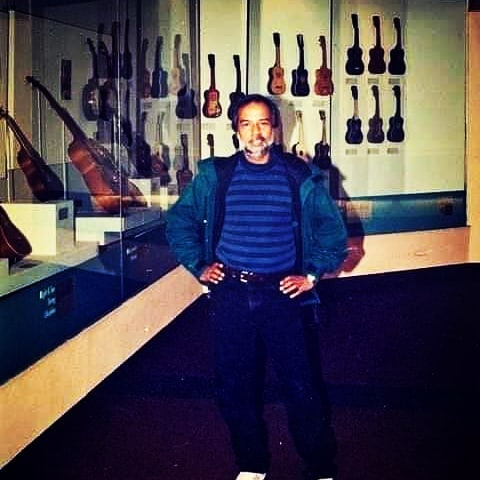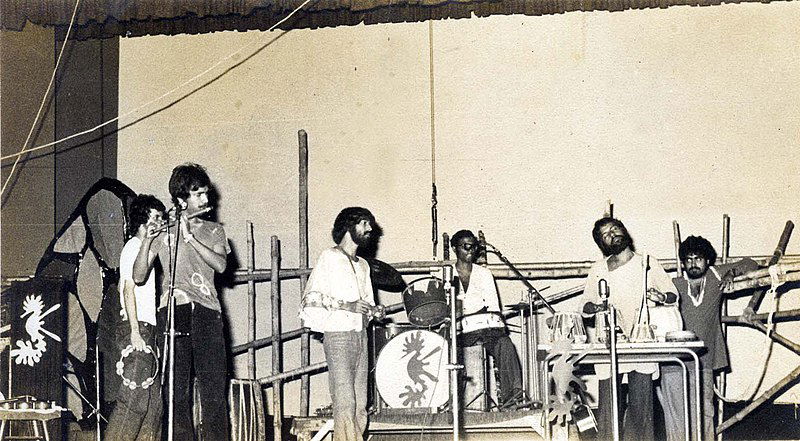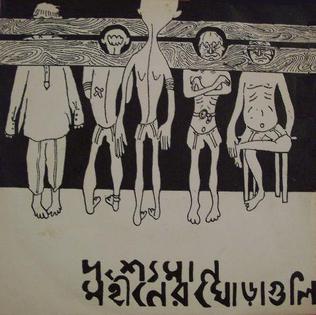Mohiner Ghoraguli: Reminiscing a Legendary Band/ Tathagata Biswas/ Issue 02
Curated and translated from the Bengali by Tathagata Biswas
“We are not yet dead till date- in spite of that spectacles always originate Mohin’s horses eat grass in the deserted moonlight of Kartik”.
– Jibanananda Das

The Band Logo, Mohiner Ghoraguli
Indeed, Mohin’s horses had arrived in the deserted moonlight of history though untimely, too early in the mid- 70s in Kolkata. Arrived like a storm that affected only a few, very few have heard them in live concerts, or through music albums. For those who don’t know of what, of whom I am referring to, for them mainly I write this short note. This note is a tribute to the first vernacular music band in the subcontinent back in the mid-70s. They have changed the tenor, spirit of writing, composing, performing and thinking songs in the Bengali-speaking world. This note is not a politico-aesthetic critique of their form of music placing them in the history of modern Bengali songs and music starting from Tagore through Nazrul Islam, D. K. Roy, Himangshu Dutta, Salil Choudhury; someone else should write it, a proper critical overview of their acts. I am not capable of performing such a necessary and difficult task. As a naïve listener who had encountered their songs in late nineties when they were reborn from the ashes of history, I can only share my listening experience of that sound which struck our generation as something we had never heard before. Their songs have shaped generations of aurophiles since mid-nineties when their album Abar Bochhor Kuri Pore: 1995 (Again after twenty years) had released followed by Maya: 1997. Why again? What now? The response to the first question would be ‘history’, to the latter, ‘politics’; the vey linguistic punctuation “?” perhaps is where their music lies!
“Ei muhurte bhitu manusher bhire basbhumi osthir ei muhurte
Kata tar periye prohora eriye ei muhurte
Dole dole hete jay bidesher seemanay ei muhurte
Notun thikana chai jekhane sobar thai ei muhurte”.
[In this moment our homeland is crowded by scared people; people are reaching the borders of foreign land disregarding fences and borderlines in search of a dwelling where there will be shelter for everybody].
This is a song written by Gautam Chattopadhyay, founder member of the band and now revered as one of the key cultural icons, the father of Bengali band music in both the Bengals. This song though was written way back in the 70s responding to the politically volatile circumstances in Bengal, when the Naxalite movement was taking place. Gautam Chattopadhyay was also a part of the movement and was jailed. When thousands of people were migrating from erstwhile East Bengal to India looking for survival, and in the world; but it still tells of the torrid times that we are going through, doesn’t it? So the time then, the time of a major political upheaval world over and in Bengal, time of hope and also the shattering of that hope in brutal ways especially for the youth is reflected in the lyrics of their songs, with a sharp political dig. We are observing globally how ordinary people, peasants, workers, innocent people are being killed, raped, forced to migrate from their homelands and made to become refugees everywhere: be it in Syria or in Myanmar. The threat of losing citizenship and becoming foreigner in your hometown is taking place in Assam, where lacs are being disqualified from citizenship and many have been sent to detention camps. This moment of displacement has been captured in their songs; unfortunately, even when I am listening today in 2021 it seems very fresh, very relevant, as if somebody wrote it today afternoon itself.
“Prithibita naki choto hote hote
Satellite aar cable er hate
Drawing room a rakha boka baksho te bondhi
…
Bhebe dekhecho ki
Tara rao joto alok borsho dure
Taro dure
Tumi aar ami jai krome shore shore.” [
The world is shrinking day by day due to cable and satellite, it is now a captive of television of your drawing room. … but have you thought that the distance between you and me has become like the stars who dwell light-years apart from each other?]
Indeed, these lines stroked our eyes in our late teens when we were being totally captured by cable television and consumerism of open-market economy which our country adopted in the early 90s. Consumption had become the new mantra, market became the omnipotent God, and capitalism the new religion of commodification. Even we didn’t get the big words then, but a critical attitude toward dominant cultural artifacts, events, was being gradually inculcated in us through these words, accompanied by its rock sound, hard hitting metal effects. It is much truer today as we have entered the digital age, where each of our moves are being monitored by smart phones, with social media platforms and apps installed in them. The worry is much more acute now. As all our likes, dislikes, sharing, comment, friendships, debates are being monitored and being influenced by AI and its algorithms. Is the world in your control, literally in your palm? Are we not getting light years apart from each other, from our near ones? Isn’t this question worth asking today especially under the conditions of Covid? Here lies the politics of their ever-new, ever-fresh, capturing of each moment.
“Akashe Chhaorano Megheder Kachchakachi … Aakaashe chharaano megher kachhakachhi,
Dekha jai tomader baadi,
Tar neel deyal jeno swapno belowari,
Tar kaach dewal jeno swapno beloaari.”
[Near the scattered clouds in the sky your abode can be seen its blue walls, its glass walls are like a chandelier of dream]
“Runway jure pore ache sudhu keu nei shunyota
Akashe tokhon thomkiye ache megh
Bedona bidhur radar er oloshota
Kinchit sukhi pakhi der shongbeg.”
[There is nobody on the runway only emptiness prevails, clouds are halted in the sky, weary lethargy of the radar, and slightly happy impulse of the birds]
How do you capture a moment only through obvert political critique of time each moment that passes through? Is there any other distinct yet related way, perhaps more poetic, to frame a moment? Indeed there are such attempts which take you to a surreal world of dreams, to an abode whose walls are made up of blue glass; they are chandeliers of dream, where a brown cat is sitting in the attic, while knitting magic in the air, and an ash-coloured owl sitting with one of her eyes closed since time immemorial; and suddenly you see your beloved appears out of a black door, and at such a moment wild flowers made the whole garden smile. In this house where your beloved lives moon-light flows through a curved staircase, in such a place you are happily lost, you don’t know anybody and nobody knows you, and it is so comforting. Here your beloved sings alone, and your hair is floating in the breeze. However, this house has no address, only the red-mud path leading nowhere. Or, imagine that you are observing an empty runway… where there is nobody, in this airport no plane has landed in a long while, and tares are scattered here and there, but you can still feel the sound of empty wings with their airborne speed of those airplanes that have not arrived. In such a frame, the adolescent girl suits well, she is crying with her scattered hair and her head into her knees. Imagine you are that bard who have witnessed this scene and you are unable to forget it, you are feeling attached to this scene, to this moment, you are in angst; may be your only companions are the clouds halted in the sky expecting a storm.
Mohin’s horses take you through a world that is surreal and bizarre, and you can smell their scent coming out of the stable rushing through the night’s breeze, a melancholic image rests upon an empty airport which reminds me of another image from the movie “Subarnarekha” (directed by Ritwik Ghatak, 1965; whom we’ll discuss some other time) where the female lead character named Sita is sitting on a deserted airport mourning, crying because of the separation from her beloved in a similar pose as described above. However, when they had arrived their generation didn’t really get their sounds, they had to wait another 20 years to become what they truly deserved. The “neolith silence” of the audience was finally broken, listeners of their music had arrived in the 90s.

Gautam Chattopadhyay
Postscript
I am writing this note in the month of June because June 01 was his birthday and on June 20, he left us (Gautam Chattopadhyay, 01 June 1949- 20 June 1999). He was also a lyricist, basist, composer for the band. In 1975, as a leader he founded the progressive rock band Mohiner Ghoraguli with Tapas Das, Abraham Mazumdar, Pradip Chatterjee, Ranjon Ghoshal, Biswanath Bishu Chattopadhyay, and Tapesh Bandopadhyay. He was also a theatre person, filmmaker, and ethnographer. He received National Film Award for his film Nagmoti (1983), and had also made another feature called Somoy (never released); A Letter to Mom, an English language film on Anglo-Indians. His first documentary was about the dhakis (drummers) of Bengal called The Primal Call. After that he made several documentaries, including The Dinosaurs, The Sun Temple of Konark, to The Naya Theatre and Habib Tanvir. Chattopadhyay was invited to Karbi-Anglong in the mid-nineties to work with the Karbi people and to preserve their folklore and folk music. He did the opera on their folklore called Hai-mu. During his college days in the 60s he played lead guitar in the band called The Urge, an English language band consisting mainly of Anglo-Indians. While studying in Presidency College he participated in the Naxalite Movement during the late 60s to early 70s. The band had experimented with western classical, rock, Jazz, Bengali folk forms, and psychedelic music. During their heydays they had managed to release three albums such as Shangbigno Pakhikul O Kolkata Bishayak (1977), Ajaana UDonto bostu ba Aw-Oo-Baw (1978), Drishyomaan Mohiner Ghoraguli (1979). Mohiner Ghoraguli was not commercially successful at the time, and the band disintegrated in 1981. During the mid-nineties, Chattopadhyay revived Mohiner Ghoraguli by releasing the albums Abar bachhor kuri pore (1995), Jhara shomoyer gaan (1996), Maya (1997), and Khepar gaan (1998). The literal meaning of Mohin’er Ghora-guli is ‘Mohin’s horses’. The name of the band is taken from a poem Ghora (Horses) from the poetry book Shatti Tarar Timir by the great modernist Bengali poet Jibanananda Das. Their legacy has continued as all the subsequent bands took inspiration from them. Some of the prominent Bengali bands are Crosswinds, Lakkhichhara, Cactus, Sohor, Chandrabindoo, Fossils.
The purpose of this brief note then is to let their words and music and politics spread as well as to pay a tribute to them in my own humble way. In the following section, there are lyrics (in the Roman script) of four of their songs with my paraphrasing in English. The YouTube links of these songs and other relevant sources of information are also given. I hope this note will invite the readers to try their music.

Live performance, Mohiner Ghoraguli, Rabindra Sadan, Calcutta, 1979
Akashe Chhaorano Megheder Kachchakachi …
[Near the clouds scattered in the sky…]
Aakaashe chharaano megher kachhakachhi,
Dekha jai tomader baadi,
[Near the scattered clouds in the sky your abode can be seen]
Tar neel deyal Jeno swapno belowari,
Tar kaach dewal jeno swapno beloaari,
[its blue walls, its glass walls are like a chandelier of dream]
Chilay- kothai bosha badami beraal bone shunye maya-jaal,
Chhai ronga pencha shei chokh tipe boshe ache koto na bochhor-kaal,
[a brown cat is sitting in the attic, while knitting magic in the air, ash-coloured owl sitting with one of her eyes closed since time immemorial]
Kaalo dorja khule baire tumi ele,
Baganer gachhe hashi chhoralo buno phuley.
[you came out of the black door, and wildflowers made the garden smile]
Ei baarir nei thikana,
Shudhu ojana laal shurkir poth shunye dey paari.
Shei baarir nei thikana,
Shudhu ojana laal shurkir poth shunye dey paari.
[this house has no address, only the red-mud path leading nowhere]
Bakano Shirir pothe shekhane neme aashe chaader aalo,
Kauke cheno na tumi tomaake chene naa keu shei to bhaalo,
[moon light is flowing through a curved staircase, you don’t know anybody and nobody knows you, and it is so comforting]
Sheytha ekla tumi gaan geye ghure phirey,
Tomaar elo chul oi batashe shudhu orey,
[there you sing alone, and your hair is floating in the breeze]
Shei baarir nei thikana,
Shudhu ojana laal shurkir poth shunye dey paari.
[this house has no address, only the red-mud path leading nowhere]
Aakaashe chharaano megher kachhakachhi,
Dekha jai tomader baadi.
[Near the scattered clouds in the sky your abode can be seen]
Written by: Dibyo Mukhopadhyay; Composition: Mohiner Ghoraguli; Album: Abar Bochhor Kuri Pore; released in 1995, by Asha Audio.
Songbigno Pakhikul
[Worried Birds]
Listen to the song here.
Runway jure pore ache sudhu keu nei shunyota
Akashe tokhon thomkiye ache megh
Bedona bidhur radar er oloshota
Kinchit sukhi pakhi der shongbeg
[there is nobody on the runway only emptiness prevails, clouds are halted in the sky, weary lethargy of the radar, and slightly happy impulse of the birds]
Emon bishal bondore bohu kal
Thameni akash bihari biman jaan
Ekhane okhane agachar jonjal
Shunyo dangay bayubito goti beg
Emon chobi te kishori manay bhalo
Frock e mukh gunje kande chul elomelo
[in this airport no plane has landed in a long while, tares are scattered here and there, empty wings with its airborne speed, in such a frame the adolescent girl suits well, she is crying with her scattered hair and her head into her knees]
Charon dekheche ei chobi khani taai
Hridoye jegeche shunoyota uru megh
Charon bhole na ei chobi khani tai
Boro maya lage boro tar udbegh
Akashe tokhon jhor eshe jabe bole
Thomkiye ache megh
[The bard has seen this image hence his heart is filled with floating clouds of emptiness, the bard has not forgotten this image, he is feeling attached, he is worried, in this same moment clouds in the sky are waiting for a storm]
Written by: Ranjan Ghosal; Composition: Mohiner Ghoraguli; Album: Songbigno Pakhikul; released in 1977, by Asha Audio.
Prithibi
[The World]
Listen to the song here.
Prithibita naki choto hote hote
Satellite aar cable er hate
Drawing room a rakha boka baksho te bondhi
[The world is shrinking day by day due to cable and satellite, it is now a captive of television of your drawing room]
Ghore boshe sara duniyar saathe
Jogajog aaj hater mutho te
Ghuche geche desh kal simanar gondi
[communication with whole world is now in your control, there is no more any barrier of space-time]
[Chorus]
Bhebe dekhecho ki
Tara rao joto alok borsho dure
Taro dure
Tumi aar ami jai krome shore shore
[but have you thought that the distance between you and me has become like the stars who dwell light-years apart from each other?]
Shaari shaari mukh aashe aar jae
Neshatur chokh TV porday
Poka-makore aguner sathe sondhi
[series of faces are passing by, your trippy eyes are on television screen, the situation is like a treaty signed between insects and fire]
Pasha pashi boshe ek sathe dekha
Ek sathe noy ashole je eka
Tomar amar faraker noya fondi
[we are watching television together sitting beside each other, but actually we all are alone; this is a new cunning way to keep us apart from each other]
[Chorus]
Swapno bechar chora karbar
Jayga to nei tomar amar
Chokh dhadanor ei khela sudhu bondi
[this secret deal of selling dreams meant to deceive us, there is no place for you and me in this game, it is only a cunning way to dazzle us, to hold us in captivity]
Tar chey esho khola janalay
Poth bhul kore kon rashtay
Hoyto peleo pete pari aro songii
[instead of being glued to television let’s come to the open window, lets tread an unknown path, who knows you may find a companion]
[Chorus]x2
Written by: Gautam Chattopadhyay; Composition: Mohiner Ghoraguli; Album: Abar Bochhor Kuri Pore; released in 1995, by Asha Audio.
Ei Muhurte
[In this Moment]
Listen to the song here.
Bhitu manusher bhire basbhumi osthir ei muhurte
Kata tar periye prohora eriye ei muhurte
Dole dole hete jay bidesher seemanay ei muhurte
Notun thikana chai jekhane sobar thai ei muhurte
[In this moment our homeland is crowded by scared people; people are reaching the borders of foreign lands disregarding fences and borderlines in search of a dwelling where there will be shelter for everybody].
Ei muhurte kono olikhito sorte
Gopone gopone chole len-den biki-kini joto maronastro (0-ho-oho)
Ei muhurte kono bhanga desh jurte
Dukhi manusher shoke concert e gan gay koto maestro
[In this moment, weapon deals are happening secretly without any written agreement. And in this very moment, many maestros are singing in concert to mourn the suffering of wretched people, to re-join a devastated country].
Pari na pari na keno bujhte, eki proponcho maya
E biswarup dekhe chup kore thaki jodi ami nehati behaya
[Why can’t I understand this false grand spectacle, this Maya, if I remain silent after becoming aware of this grand spectacle (biswa-rupa), then I really am a shameless person].
Ei muhurta, tritiyo biswa jure monnontor bare ei muhurte
Khora ar bonna, shishuder kanna ei muhurte
Jibon dharone glani, shudhu miche hoyrani ei muhurte
Buker bhitore khoto chhoriye itostoto ei muhurte
[In this moment the rate of famines, droughts, floods are increasing in the third world. Living a life, where each moment is marked by harassment and shame. There are wounds scattered here and there in those hearts].
Ei muhurte, karo kono swarthe
Chiro horiter bon fike hoy mohiruh potoner sobdo
Ei muhurte, odhikar karte
Onek ashar kotha bolechil zara tara sokolei stobdho
[In this moment, to fulfil somebody’s vested interest, forests are being destroyed, the sound of falling trees can be heard. And in this moment ones who gave hope to snatch rights of the people are silent today].
Pari na pari na keno bujhte , eki proponcho maya
E biswarup dekhe chup kore thaki Jodi ami nehati behaya
[Why can’t I understand this false grand spectacle, this Maya, if I remain silent after becoming aware of this grand spectacle (biswa-rupa), then I really am a shameless person].
Ei muhurte, niswase prosshase ghun dhore biswase ei muhurte
khola bazarer haowa chupi kore dhaowa ei muhurte
haoway asukh hoy bhitore bhitore khoy ei muhurte
tobuo manush hase, gan gay bhalobase ei muhurte
[In this moment, our breath, our faith all are being eaten by insects. Wind of open market is secretly chasing us, the air we breathe makes us sick, we are decaying from inside. However, people still smile, sing, and love in this moment].
Ei muhurte, ei somoy ke dhorte
buddhimanera joto bani dey shoto shoto smaj ta gorbar
ei muhurte, tobu protirodh gorte
bokara swopno dekhe abar swopno dekhe prithibi ta sajabar
[To capture this moment intellectuals are delivering speeches and lectures on how to build this society. However, only idiots are building resistance, dreaming about reorganizing the world].
Pari na pari na keno bujhte , eki proponcho maya
E biswarup dekhe chup kore thaki Jodi ami nehati behaya
[Why can’t I understand this false grand spectacle, this Maya, if I remain silent after becoming aware of this grand spectacle (biswa-rupa), then I really am a shameless person].
Ei muhurte, Bokara swopno dekhe prithibi ta sajabar ei muhurte
Bokara swopno dekhe prithibi ta sajabar ei muhurte
Bokara swopno dekhe prithibi ta sajabar ei muhurte
Bokara swopno dekhe prithibi ta sajabar ei muhurte
[In this moment idiots are dreaming about organizing the world
in this moment idiots are dreaming about organizing the world
in this moment idiots are dreaming about organizing the world
in this moment idiots are dreaming about organizing the world]
Written by: Gautam Chattopadhyay; Composition: Mohiner Ghoraguli; Album: Maya; released in 1997, by Asha Audio.

Album Cover, Drishyoman Mohiner Ghoraguli, 1979
Note: For the translation of the entire poem titled ‘Horse’ by Jibanananda Das, see the first issue of gulmohur quarterly, where the author of this piece had translated five of Das’s poems.
References
Listen here: Aakashe Chhorano Megheder Kachhakachhi [Near the clouds scattered in the sky]
Listen here: Songbigno Pakhiku [Worried Birds]
Listen here: Prithibi [The World]
Listen here: Ei Muhurte [In this moment]
Wikipedia entry on the founder member of the band Gautam Chattopadhyay
Wikipedia entry on the band Mohiner Ghoraguli
For photos of Mohiner Ghoraguli at Wikimedia Commons
Tathagata Biswas is a student of philosophy, interested in modern Bengali literature and contemporary social-political movements. He looks forward to your feedback on his translations of the songs in this issue. He has also translated from English to Bengali various articles written on the Yellow Vest Movement in France (available here: Halud Barud/ Tathagata/ Amazon).